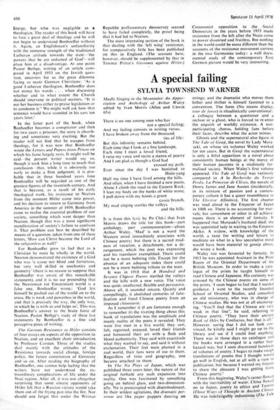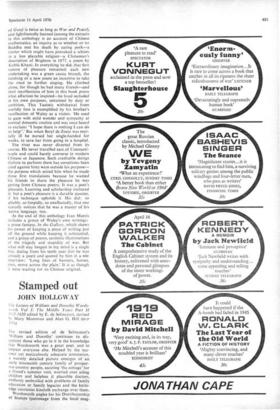A special failing
SYLVIA TOWNSEND WARNER
Madly Singing in .the Mountains: An Appre- ciation and Anthology of Arthur Waley edited by Ivan Morris (Allen and Unwin 65s) There is no one among men who has not a special failing; And my failing consists in writing verses. I have broken away from the thousand ties of life: But this infirmity remains behind.
Each time that I look at a fine landscape, Each time I meet a loved friend,
1 raise my voice and recite a stanza of poetry And I am glad as though a God had
crossed my path.
Ever since the day I was banished to Hsiin-yang Half my time I have lived among the hills. And often, when I have finished a new poem, Alone I climb the road to the Eastern Rock. I lean my body on the banks of white stone; I pull down with my hands a green cassia branch.
My mad singing startles the valleys and the hills.
It is from this lyric by Po Chil-i that Ivan Morris draws the title for this book—part anthology, part commemoration—about Arthur Waley. 'Mad' is not a word the Western mind immediately associates with Chinese poetry; but there is a sacred mad- ness of vocation, a detachment, not a de- rangement, which the poet was expressing and his translator exemplified. There could not be a more befitting title. Except for the absence of an adequate index there could not be a more befitting tribute to the man.
It was in 1918 that A Hundred and Seventy Chinese Poems startled the valleys and the hills with a new voice. The voice was quiet, unaffected, flexible and persuasive. Above all, it sounded sincere. Quietly and compellingly, it abolished centuries of falsi- fication and freed Chinese poetry from an imposed chinoiserie.
As I remember it (I am fortunate enough to remember it) the riveting thing about this book of translations was the amplitude and manly reality of the poets it revealed. They were live men in a live world; they saw, felt, regretted, enjoyed, -loved their friends and honoured their art with-'a flesh and blood authenticity. They said with exactitude what they wanted to say, and said it without exclamation. Their feet were planted in a real world, their fans were of use to them. Regardless of time and geography, one became attached to them.
In The No Plays of Japan, which- was published three years later, the nature of the original forbade any such expansion into reality. One was fascinated by something going on behind glass, and two-dimension- ally. No is preoccupied with disembodiment. In their wildest agitations, the dramatis per- sonae are like paper puppets dancing on strings; and the dramatist who moves them hither and thither is himself fastened to a convention. The form (No means display, tour de force) is ritualistically conventional:
a colloquy between a questioner and a recluse or a ghost, who is forced to re-enter
the anguish of worldly existence. A non- participating chorus, holding fans before their faces, describe what the actor mimes.
Ghosts and the supernatural also figure in The Tale of Genji, the novel by Lady Mura-
saki, on whose six volumes Waley worked
for ten years. But in Genii the supernatural is only a fitful apparition in a novel about consistently human beings at the mercy of their human passions in a studiously for- malised society. v■rtien Waley's first volume appeared, The Tale of Genii was variously compared to A la Recherche du Temps Perdu, La Princesse de Cleves, the novels of Henry James and Jane Austen (incidentally, in its mixture of passion and a contem- porary culture it has a queer resemblance to The Elective Affinities). The first chapter was read aloud to the Emperor of Japan in 1008 AD. There is no accounting for mar- vels; but somewhere or other in all achieve- ments there is an element of fortuity. It happened that Murasaki's husband died; she was appointed lady in waiting to the Empress Akiko. A widow, with knowledge of the world, a taste for writing and leisure to meditate on what to a less speculative mind would have been material to gossip about, she wrote a book.
Waley too was favoured by fortuity. In 1913 he was appointed Assistant in the Print Room of the Oriental Department of the British Museum. In order to make a cata- logue of the prints he taught himself to read Chinese and Japanese. His curiosity was aroused by the Chinese poems on some of the prints. I soon began to feel that I needed guidance. I went to the recently founded School of Oriental Studies, and consulted an old missionary, who was in charge of Chinese studies. He was not at all encourag- ing. "You'll find that the Chinese are very weak in that line", he said, referring to Chinese poetry. "They have their ancient Book of Odes by Confucius, but that is all." However, seeing that I did not look con- vinced, he kindly said I might go up to the library and see if I could find anything. There was in those days no catalogue and the books were arranged in a rather hap- hazard way, but I soon discovered hundreds of volumes of poetry. I began to make rough translations of poems that I thought would go well in English, not at all with a view to publication, but because I wanted my friends to share the pleasure I was getting from Chinese poetry.' From this beginning, Waley's career flowed with the inevitability of water. China flowed on to Japan, poetry to ethics and Taoism (Three Ways of Thought in Ancient China). He was indefatigably industrious (The Tale
of Genji is twice as long as War and Peace), and lightfootedly learned (among the extracts in this anthology is an account of Chinese mathematics, an inquiry as to whether or no Buddha met his death by eating pork—a matter which might have provoked a schism in a less placable religion—a Chinaman's description of Brighton in 1877, a poem by Kubla Khan). In everything he did, that first motive of pleasure remained; each new undertaking was a green cassia branch, the finishing of a new poem an incentive to take the road to further singing. He climbed alone, for though he had many friends—and their recollections of him in this book prove what affection he inspired—he lived secluded in his own purposes, untainted by duty or ambition. This Taoistic withdrawal from worldly fuss is exemplified by his brother's recollection of Waley as a visitor. 'He used to gaze with mild wonder and sympathy at normal domestic routine and was once heard to exclaim "I hope there is nothing I can do to help".' But when Beryl de Zoete was mor- tally ill he nursed her single:handed for weeks, to save her from going to a hospital.
The river was never diverted from its course. He never travelled east of Constanti- nople and could barely converse in modern Chinese or Japanese. Such creditable doings (failure to perform them has sometimes been cited against him) were outside his purpose— the purpose which seized him when he made those first translations because he wanted his friends to share the pleasure he was getting from Chinese poetry. It was a poet's pleasure. Learning and scholarship sheltered it; but a poet's pleasure is a durable passion, if his technique upholds it. His did: so pliably, so limpidly, so unaffectedly, that one scarcely notices that he was a master of his native language, too.
At the end of this anthology Ivan Morris includes a group of Waley's own writings : a prose fantasy, In the Gallery, which shows his power of keeping a piece of writing just off the ground while keeping it substantial, and a group of poems, sardonic illuminations of the tagedy and stupidity of war. But what will stay longest in my mind is a single line, dating from his tenth year (for he was already a poet) and quoted by him in a BBC interview: 'Long lines of banners, horses, men, move across the plain.' It is as though it were waiting for its Chinese original.







































 Previous page
Previous page